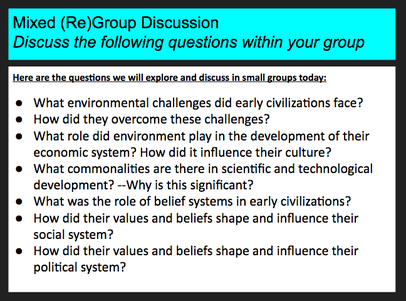 As each group has presented the four early river civilizations, we start to see key characteristics emerge that they have in common. Today, we will review and discuss what these are and the role that their values and beliefs played in the development of their human-created systems they developed. We also see the role that environment played in the development of their systems as they adapted to and modified their environment as their civilization grew. Today you will also join two new online platforms: The Big History Project (register as a student) Big History Project Join Classroom Codes: A1 Code: 9PW6D3 A4 Code: ARX9TB B1 Code: H3GJQW B3 Code: QH1SPD B4 Code: FEFHJX Also please register for ExitTix - use the following codes for your class block. Please use your SAS username and password when you register as a NEW account member (the sign in credentials you use for your school Google account) Today's Exit Ticket: Quiz Time (don't worry... its formative --and relatively easy and short!)
Homework/Prep:
Go through "The Big History Project" website. Explore the videos and information presented in Unit 7: Agriculture and Civilization. We will move beyond this topic when our class meets next time into World Religions. Be sure you have a solid foundation and understanding about why early civilizations began to settle where they did, what they had in common and how their ideas about the world and beliefs influenced the way they organized society. There is no written requirement for homework but taking notes may be helpful. When you come to class next time, you will be expected to write for 20 minutes answering/responding to some of today's group questions about how early civilizations organized and developed systems based on their values and beliefs. You will be allowed to use your notes for reference during your 20-minute writing practice. You will be formatively assessed for your writing sample using the Explanatory Rubric (development and analysis strands only). 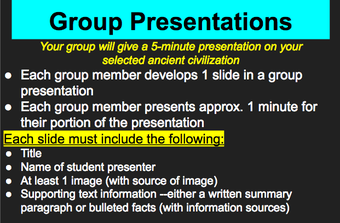 Students will work together with their group to further develop a group presentation to share what they have learned about their selected ancient civilization. Student groups will give a 5-minute presentation to their classmates. Each member within a group must present their own slide and speak to the class for approx. 1 minute. Instructions:
Students need to put their name on their slide. The 1-minute presentation will be formatively assessed using the Explanatory Writing rubric on your presentation slide for your written communication of what you have learned. You should have a title, an image (with citation), a brief explanation of your topic/focus within the group, and your source (textbook, etc.) HW Prep: Formative assessment
You will be formatively assessed on your notes (in WH Drop folder) the Inquiry Rubric for 2 strands: the Collecting Evidence strand and the Analysis strand. For homework, be sure to go back and look over your notes (only for the section/system YOU presented on in class) and ensure you have included your sources (reference either the textbook with page number, the World History Vol. 1 pdf document or an online source for your notes). Be sure you have summarized your understanding of the system/section and you have asked further questions (this shows analysis). It will be helpful if you can HIGHLIGHT or change the color of the table for the section you are focusing on and have presented on in class.
In today's class, we will begin to examine what we know about systems and how prehistoric humans began to settle down and develop systems to help them sustain themselves in one area. We will examine their ideas (based on artifacts), values, and the formation of religious ideas (beliefs) and practices (rituals). We will also look at how what they valued and understood (believed) about the world shaped their development of systems: economic, political and social systems.
Today's Presentation You will be assigned to a group in today's class and begin to explore and examine an ancient civilization in understanding more about how they lived, how they began to develop tools and methods that allowed them to settle into an area and how they began to organize their society in a much more complex and structured social, political and economic system. Your group will focus on how their values and ideas and beliefs began to also develop and the role religion played in influencing their daily life and affected how they organized their society. Groups: Mesopotamia
Classes will be introduced to and given a brief overview to Unit 1: Value & Belief Systems
Helpful resources for today:Homework: Read article: Belief: Being Human & write a blog post (see image below) You will develop your first formative writing in class based on what you have researched and understand about your selected global issue/topic.
This is completely formative and will serve as your first writing sample so that we have a baseline of what your level of writing is and understand your strengths in writing and any areas that we can work on to make you a stronger writer. Here is the link to today's writing task: Global Issues Formative Writing (you do NOT need to copy this--you will receive a paper copy of this) |
Mrs. Stewart's CourseYou'll find a daily agenda posted here for each day that class meets Archives
May 2020
Categories |
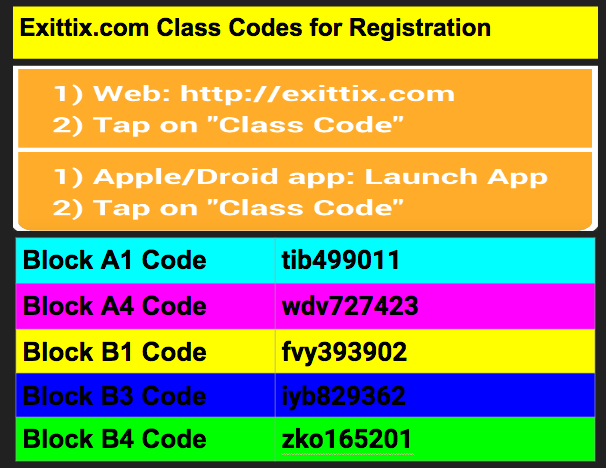
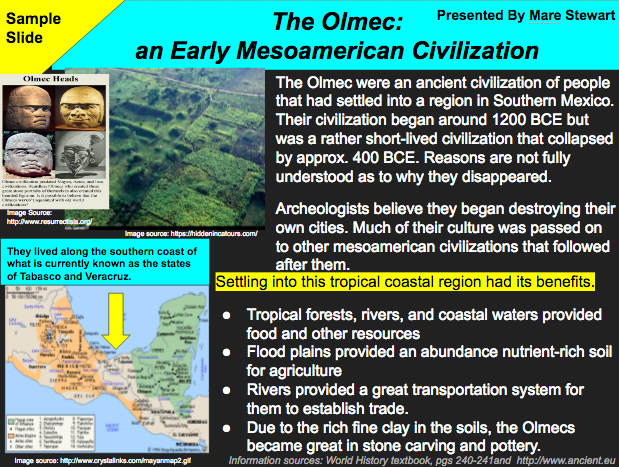

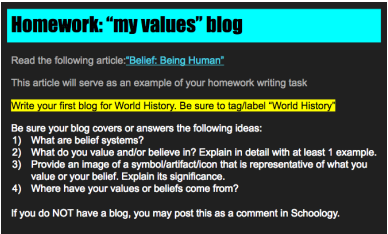
 RSS Feed
RSS Feed